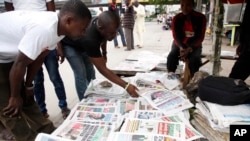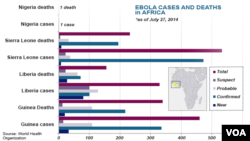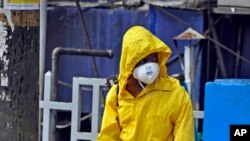The Nigerian government says communication is its first line of defense against Ebola. With no known cure and new fears about a potentially infected corpse found at a mortuary, health officials are Facebooking, Tweeting and writing radio jingles in an effort to reach everyone in Africa's most populous country. Their main message is “Wash your hands.”
If there can be such a thing as “good news” about Ebola, there was good news in Nigeria on Thursday.
“At the moment there has not been any single additional incident of infection that has been reported. And this is important because we are beginning to see some panic reports, particularly within the social media," Minister of Information Labaran Maku said.
The only known Ebola death in Nigeria was Patrick Sawyer, a Liberian-American who died in Lagos two weeks ago. The 69 people known to have had contact with Sawyer are all being monitored. Two are in quarantine.
The more time that passes with no new infections, the more likely it is that Sawyer didn’t pass Ebola to anyone in Nigeria.
Precautionary measures
But new fears are rising.
In an interview with a local television station, Anambra State Health Commissioner Joe said police have shut down a mortuary in his state, fearing the body of a man who died in Liberia, and was transported to be buried in Nigeria, was infected with Ebola. Mortuary workers have been isolated as a “precaution” as they await results of blood tests from the body.
In neighboring Delta State, residents of Warri, a crowded, chaotic oil city, say they fear an Ebola outbreak in Anambra would quickly reach them.
The rapidly spreading disease has killed more than 700 people this year in Guinea, Liberia and Sierra Leone.
Most at risk
Mike Igini, who runs a medical lab in Warri, says the most frightening thing about Ebola is that medical workers are the most likely to get infected.
“There is much fear and there is apprehension already because we don’t know whether it’s going to spread to this place very soon or even if it’s already. Though no major case has been reported, there is fear all over the place," said Igini.
Alleviating fears, he says, would require a massive education campaign that lets everyone know how to protect themselves from getting infected. And officials say that is exactly what they’re doing.
“We are adopting different channels to reach out to the people, the traditional media, radio and television. We’ve agreed on programs in the next couple of days to weeks, you will see programs on television," Minister Maku said.
Facebook, Twitter, Mobile
Health officials are also posting information about how the disease spreads and numbers to call for questions or to report illness on their Facebook page, that are being Tweeted by other agencies, like the Nigerian Police.
And while about half of all Nigerians don’t have access to electricity, let alone Twitter, next week officials say Ebola information will be sent to people’s mobile phones.
And the messages they will send are fairly simple. Health officials urge people to avoid handling bats or primates or eating unregulated “bush meat.” Most importantly, they say, the public is urged to wash their hands after touching people or surfaces, especially in a hospital.
Hilary Uguru contributed to this report from the Niger Delta.







